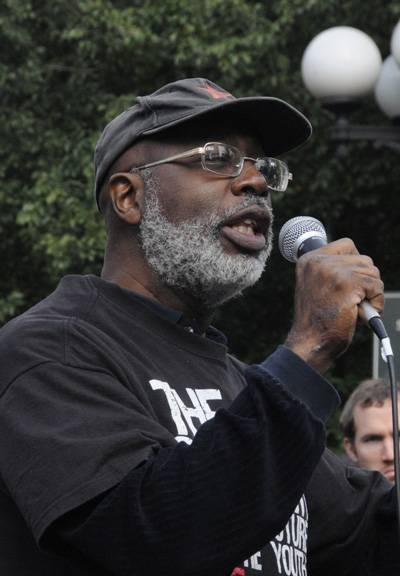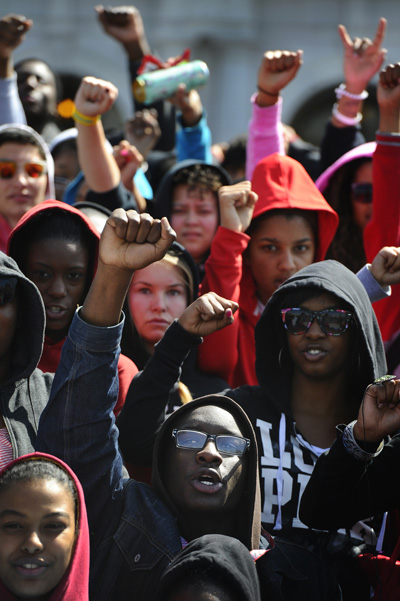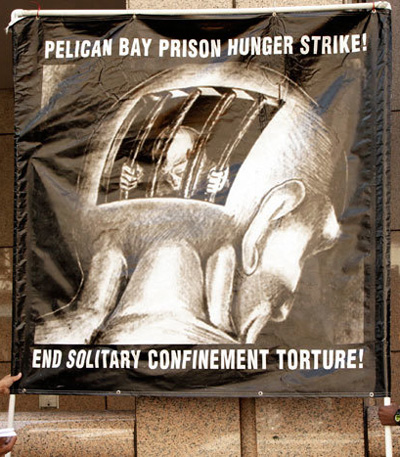O22: National Day of Protest to Stop Police Brutality, Repression and Criminalization of a Generation
Interview with Carl Dix
September 16, 2013 | Revolution Newspaper | revcom.us
Carl Dix is a founding member of the Revolutionary Communist Party and one of the initiators of the October 22nd Coalition to Stop Police Brutality, Repression and the Criminalization of a Generation. He was recently interviewed by Revolution/revcom.us correspondent Sunsara Taylor on a range of questions relating to the movement to stop mass incarceration, the fight to stop the slow genocide against Black people, and how to do all of this as part of building a movement for real revolution to get rid of this system at the soonest possible time and to bring into being a far better world. The following is an excerpt from the interview. The entire interview, slightly edited for publication, will be posted soon at revcom.us.
—Editors
Sunsara Taylor: So, we are looking about a month out, a little more than a month out to October 22, this is a, it’s a major national day, every year. October 22, it’s a National Day of Protest to Stop Police Brutality, Repression and the Criminalization of a Generation. What’s the significance of this? Maybe you could talk a little bit about where this came from, what is this protest? But also what’s the significance of it this year coming off the George Zimmerman verdict, coming off the recent hunger strike among prisoners in California, at a time when there’s a lot is happening in society and in the culture, raising the question of the condition and the treatment historically and today of Black people in this country and other oppressed peoples, at a time of slow genocide? What do you think we need to be understanding at this moment and doing to act on that understanding, looking towards October 22?

Carl Dix. Photo: Li Onesto/Revolution
Carl Dix: OK, well, this year, it’s the 18th annual National Day of Protest to Stop Police Brutality, Repression and the Criminalization of a Generation. And where this came from was back in the 1990s a few of us began to talk about like, look, all across the country police are brutalizing and even murdering people and getting away with it and we have to take the resistance to this to a national level and direct, develop it further. We have to bring together, you know, broad sections of people, not just those who have to deal with this all the time, but we need to bring broad sections of people into this fight against police brutality and police murder. And we have to take people whose lives have been devastated by this and actually mobilize them to come out and speak about what had happened to them, what had happened to their loved one, what it did to their family, to bring that out and make that exposure very widely known. Because what would happen is: the police would kill somebody and then this person would be demonized and the actual truth of what happened and the fact that most of the people killed by police were unarmed, not involved in criminal activity, was not something that very many people knew about. So that’s what we were moving to do back in 1996 and it was an interesting array of people, you know. Food Not Bombs, which was a—an anarchist was the guy who had organized that: the MOVE family was involved in it; National Lawyers Guild. And we got a number of family members of people who had been murdered by the police and brutalized by the police who were involved in bringing that together. And then as you trace it over the years, there have been things like involving people who were mobilizing around the killing of immigrants on the border and bringing that in. Also involving gay and lesbian groups and one very important period for that was in the late ’90s, 1998 I believe, when the police in New York had vamped on people who were holding a vigil around Matthew Shepherd, who was a gay man who was beaten to death, you know, outside a bar, out in, somewhere in the Northwest, I forget exactly where. And the NYPD was like, no, you will not be allowed to hold the vigil around this and brutalized people who did it, and then October 22 came a little bit after that and we welcomed people who had been involved in that vigil to be a part of this because this was a question of the society officially saying that this young gay man’s life was worthless, and people who wanted to express something around it did not have the right to do that. So that’s been the way that October 22 has developed and the way that it has brought together diverse kinds of people.

Wearing hoodies in Denver, April 2012. Photo: AP
And at this moment, it is very, very important that this day be marked because we’re talking about something that has continually been a part of this society. It isn’t like it’s gone away, it’s in fact intensified. And the repression has intensified and the criminalization of a generation has also intensified. We also have to bring into it and have brought into it the way in which Arabs, Muslims, and South Asians have been targeted and demonized since September 11, 2001. That’s been another important part of it; and there’s just been a recent exposure about just how widespread the spying on those sections of people have come down. And it is very important that right now, in the wake of the Trayvon verdict, when so many people, when for a lot of people had their eyes opened to the fact that this kind of criminalization goes down in society and is a widespread feature of it. And the way that for so many other people who knew about it, but the way in which the Trayvon Martin murder went down and the way that the system refused to even arrest Zimmerman for murdering Trayvon, and then when they were forced by outcry all across the country to put him on trial, put together a trial that exonerated him, moved people to stand up in outrage. Look, if you remember that outrage, whether you experienced this for the first time, or whether it’s what you’ve lived with your whole life. If you remember what you felt, if you still can’t think about that because, what the fuck, how to, what to make of something like that coming down. If you do think about it and can’t sleep at night about it, you have to act on October 22. You have to be out among the people, mobilizing to bring others to it. This has to be a day when all across the country people are taking to the streets in outrage, holding cultural events, teach-ins, and in other ways spotlighting the horrific reality of police brutality and murder, the widespread repression and the criminalization of whole generations of youth. This has got to be something that people respond to.
And then, even more than, that we have this thing: wear black on October 22 and people should do that. But we gotta add a new ingredient to it this year. This year, wear black and hoodies back up. Put your hoodies up because we gotta bring Trayvon out in a very big way in this, you know, because this actually brought to life the reality that a whole generation of youth have been just made permanent suspects in this society and can be brutalized and murdered and nothing is gonna be done to ’em. And we have to say in a loud, powerful, united voice: No More! No more will we sit back and allow this to go down. No more will this be allowed to go down without being met with determined, powerful opposition.
So we have to spread this across the country. If you’re on campus, you gotta organize something on your campus, involve the students there in it. If you live in a housing project, work to get people together around that. If you’re in a city where October 22 is already planned to happen, hook up with the people doing it and be a part of that. But if you don’t know of anybody doing anything in your city around October 22, then organize something and contact us and we’ll put you in touch with the October 22 National Office and get it all worked out. And if there’s somebody else doing something, we’ll put you together with them. But make sure that something is happening there.
And see this is very, very important from the perspective of dealing with the way in which large numbers of people were moved to ask big questions coming off of the Trayvon case: What does this mean? Black people who were saying: What does this mean for me? How do I talk to my children about this? What future can a society like this have for us? But also for white people who were saying: I don’t want to live in, I don’t want to be a part of a society, where this can go down. This is very, very significant and—look, as a revolutionary communist, I’m gonna be taking to people; and people who agree with that need to be taking to people that this happens because of the very nature of this capitalist-imperialist system; not only this horror, but the many other horrors—the vicious attacks on women in this society, the wars for empire, the drone missile strikes, the widespread government spying programs, and all the rest—that’s where all of that comes from. And we can end all these horrors—things don’t have to be this way—through revolution. We have the leadership for this revolution in Bob Avakian, the leader of the Revolutionary Communist Party and [we have] the new understanding, or synthesis, of communism that he’s developed. We’ve got a strategy and a plan for making this revolution and we got a vision for the kind of world and society that could be brought into being after the revolution.
All of this needs to be out there for people. And I’m gonna be working to bring that out to people. And people who want to dig into this and engage it should go to the website revcom.us because that strategy for revolution is there. The Constitution for the New Socialist Republic in North America (Draft Proposal) is there and the works of Bob Avakian are also available there. The film REVOLUTION—NOTHING LESS!, which gets deeply into all that I’ve been talking about here today and much, much, more. You can get hooked up with that there, you can also get hooked up with BAsics, which has quotations and essays from the writings of Bob Avakian. People need to check that out, people need to be engaging that, people need to be digging into it and they need to be acting, especially on that day.
Stop police brutality, repression and the criminalization of a generation. Hoodies up and wear black and no more to this official brutality and murder that this system has been bringing down and repression that this system has been bringing down on people all across the country.
Taylor: Recently prisoners in California waged a really important, inspiring hunger strike. How do you see the significance of that, both in terms of what it represents more broadly, and also in light of the fact that October 22 this year is happening in the wake of the prisoner hunger strike in California?
Dix: I’m glad you asked that question. First, let me go back to what I said about how O22 developed, because one person who played a critical role in assembling the original coalition that made October 22nd happen was Akil Al-Jundi, who was one of the leaders of the 1971 rebellion in Attica prison in New York. That was a very significant rebellion in the 1960s, and it helped to bring a lot of people from that generation, myself included, into more radical and even revolutionary resistance to the crimes of the system back then. And Akil, who passed away in 1997, played a critical role in forging the original October 22nd Coalition.

A banner at a protest in support of the prisoner hunger strikers, August 2013. Photo: Special to Revolution
And the hunger strike that prisoners launched in California on July 8 of this year was the most significant outbreak of resistance from among prisoners since the Attica rebellion. You had 30,000 prisoners in California involved at the start of that hunger strike, standing up to end conditions that amount to torture. People held in long term solitary confinement—and there are more than 80,000 people held in those conditions—are confined in small, windowless cells 22½ hours a day and longer. Many of these cells are soundproof. Some of the people are denied any human contact. People get put into these conditions arbitrarily, at the whim of a prison administrator or a guard, and there is no way to challenge being placed there. International studies have found that being held in these conditions for more than a few weeks can drive people insane—people in U.S. prisons have been held in these conditions for months, years, and even decades!
People in prison in California stood up and put their lives on the line to end this torture, and hundreds of people carried it on for two months. And leading into the hunger strike, the prisoners called for a Cessation of Hostilities—an agreement to end all fighting among the prisoners on the basis of race. This is tremendously significant because one of the ways prison authorities keep the prisoners under control is through sowing divisions in their ranks and exacerbating divisions that already exist. But these prisoners, who are condemned as the worst of the worst, are rising above those divisions based on race to stand united to fight against injustice and calling on people outside the prisons to also rise above those divisions and stand together.
This hunger strike has been suspended now, but the struggle to end torture in prison continues. A lot of work was done to bring into the light of day the torture that is being inflicted on people in prison. The families of many of the prisoners spoke out; many well-known people also spoke out in support of the prisoners; an Emergency Call to End Torture in Prison—signed by hundreds of people including many prominent people—was published as an ad in the Los Angeles Times newspaper and then re-published in another newspaper in California. But still not enough people know about the horrors people are subjected to in prison or about the heroic struggle these prisoners waged against these torturous conditions. And on October 22 and in building up to October 22, work is going to be done to make many more people aware of the horrific conditions in prisons and the heroic struggle waged by the prisoners to end those conditions and the need to carry that fight forward.
![]() Listen to a partial audio of this interview here at revcom.us.
Listen to a partial audio of this interview here at revcom.us.
Comments